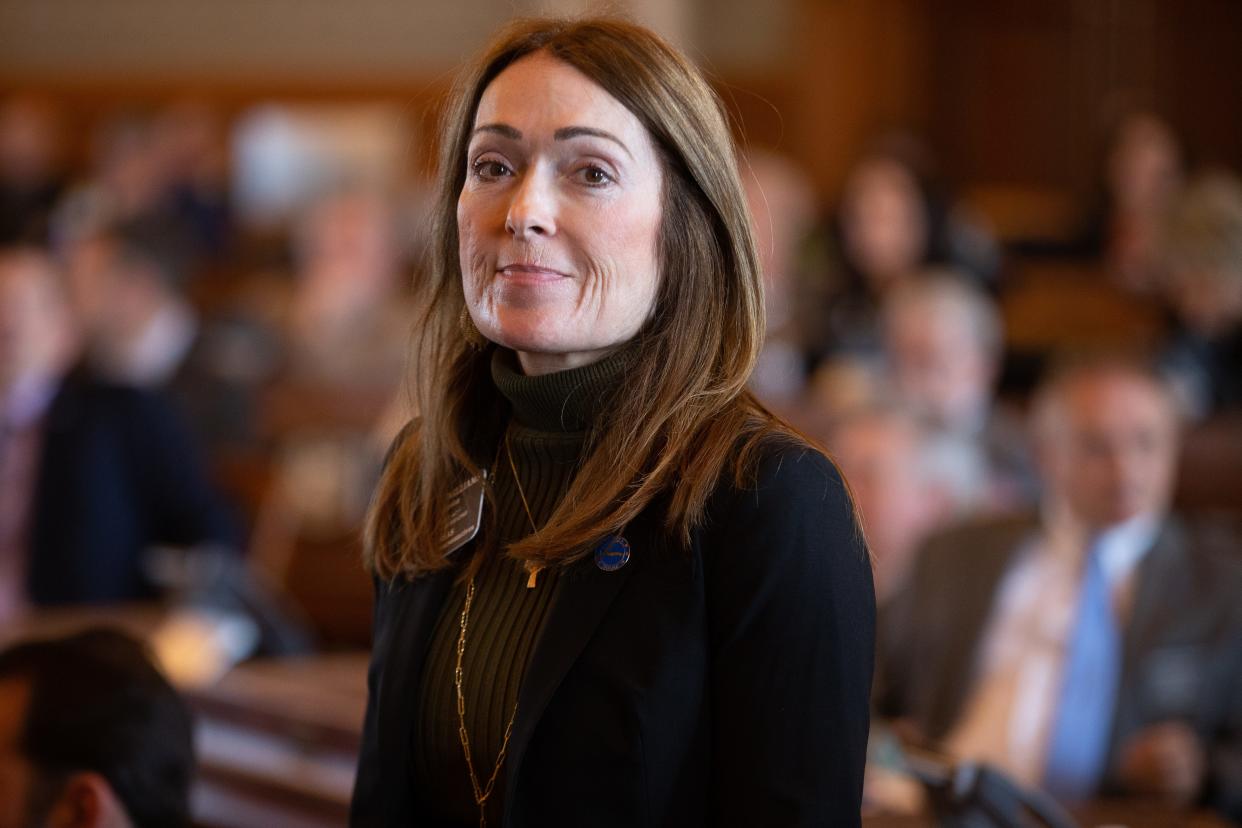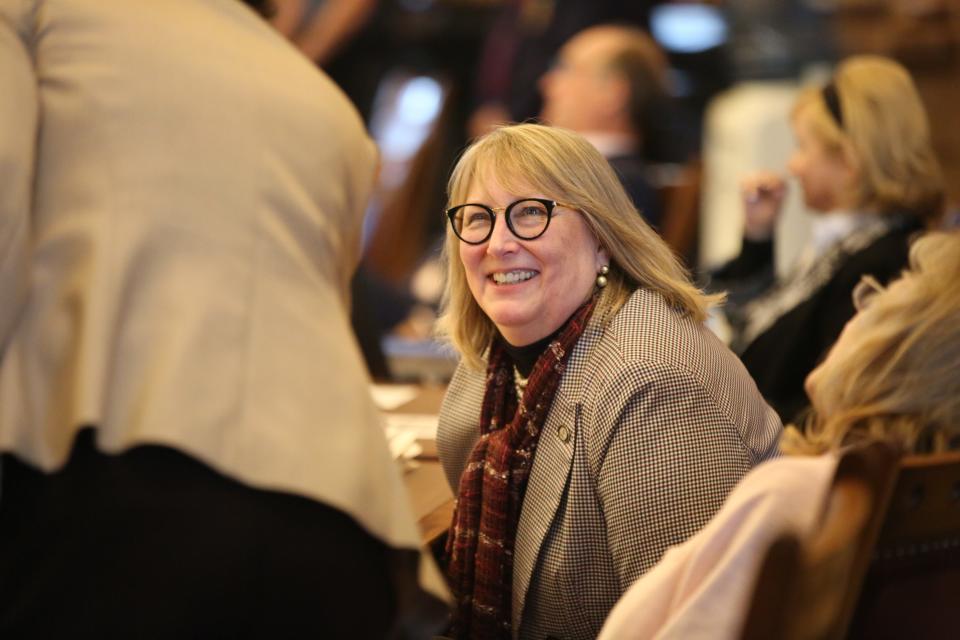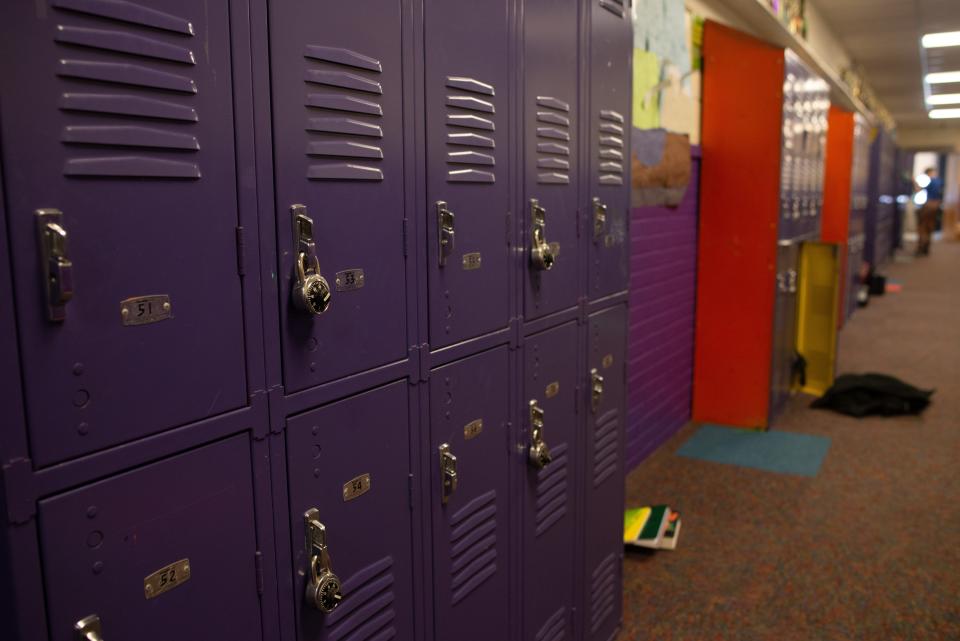Controversial school choice bill flops in Kansas Legislature. Republicans vow to keep trying.

- Oops!Something went wrong.Please try again later.
Republican lawmakers saw a negotiated school choice proposal fail early Friday morning in the Kansas Senate amid stiff opposition from public education advocates, while the fate of an education budget that districts say will cost them hundreds of millions of dollars remains in question.
School districts had excoriated the choice proposal, Senate Bill 83, which also would have included the first year of a plan from Gov. Laura Kelly to increase special education funding, as tantamount to school vouchers. Proponents argued it is a way of helping low-income students and giving parents greater educational freedom.
More: Democrats cry foul as Republicans attach raises, special education funding to voucher bill
The Senate has killed similar proposals in the past, most notably in a dramatic 2021 vote. But lawmakers were optimistic they would have a different result this year, though a veto from Kelly would have been difficult to overcome.
It comes alongside an education spending blueprint for three fiscal years, which has garnered equally stiff opposition amid concerns that it could violate a court-mandated funding plan for Kansas schools. Lawmakers adjourned early Friday morning without considering the measure, leaving it for their return to Topeka in late April.
Public school advocates point to figures from the Kansas State Department of Education alleging the plan in Senate Bill 113 will cost districts $215 million in the 2024-25 school year.
Senate President Ty Masterson, R-Andover, told reporters he believed his caucus supported school choice and didn't rule out trying a similar policy before lawmakers adjourn for good.
"The Republican caucus wants school choice and the Democrat segment of ours don't," Masterson said. "And under a Democratic governor it is hard to get supermajorities in anything really. So, you try again."
Public schools and their allies have seen the bills as much more nefarious.
"We've stirred up all of this drama and anger," said Leah Fliter, a lobbyist for the Kansas Association of School Boards. "And so, I'm not really sure what the endgame is here other than to just make people take bad votes and to spend a lot of time bashing public schools."
School choice has been a Republican priority nationally but falls short in Kansas
School choice policies have been a Republican priority nationwide this year. In Iowa, Gov. Kim Reynolds signed into law a measure creating education savings accounts, which allow private school students to access public dollars to pay for tuition and other expenses.
A similar proposal was considered in the Kansas House, narrowly passing the chamber after a contentious debate.
More: With Republicans divided, major school choice bill narrowly passes Kansas House
Those worries were echoed with SB 83, which public school advocates say is a revamped version of the ESA proposal. Twenty Republicans in the House crossed party lines to oppose the bill, many from rural areas.
In the Senate, the measure failed on a 17-20 vote. Democrats immediately invoked a procedural move to avoid it being reconsidered at a later date.
Many Republicans had argued the plan mirrors a program proposed by the Kelly Administration in 2021 to provide grants for low-income students to help make up for learning loss during the COVID-19 pandemic. That program only began earlier this year after a nearly 18-month delay.
Rep. Kristey Williams, R-Augusta, chair of the House's education budget committee, maintained that public schools "will always be the No. 1" option for students to be educated. But she mirrored past arguments from conservatives criticizing test scores in Kansas' public school system.
Speaking with reporters, she said she still envisioned a path forward for school choice measures.
"I think kids in Kansas need an opportunity to try something different and to have the best possible education that they can," Williams said.
The Kansas Education Enrichment Program would have two components. One would be a one-time $1,000 grant for both public and private school students, largely mirroring the parameters of Kelly's proposal.
More: Kansas program to give $1,000 to some families to fight learning loss. Here's how to apply
The other would be the program only for private school students, which would provide funding of around $4,600 per student.
Families making up to 250% of the federal poverty line would be covered. For a family of four, that income level would amount to $66,250 per year. Eligible expenses include not just tuition at a "qualified education service provider" but also tutoring services, textbooks and even musical instruments.
"Voucher bills are irresponsible fiscal policy that allocate tax dollars to private entities that, as we have seen, are unregulated," said Mari-Lynn Poskin, D-Leawood. "… Is there accountability for the tax dollars? That's our No. 1 job here, is to be good fiscal stewards of taxpayer dollars."
SB 113 would also expand a program providing income tax credits for donations by individuals and businesses to fund scholarships to private schools. The measure would increase the credit to 75% of a donation.
More: Kansas school vouchers, education savings account and tax credit scholarships explained
According to the Kansas State Department of Education, 2,478 students benefited from the tax credit scholarship program in 2022, with the students coming from 94 school districts across the state, though the bulk of them hail from Kansas' more urban communities like Wichita, Kansas City and Topeka.
Kansas Legislature pairs policy with money in $6.4 billion public school budget

Lawmakers, meanwhile, left town before handling a $6.4 billion budget for K-12 education, which maintains historic funding levels for schools, albeit with a side dose of contentious policy items.
First and foremost is a potential freeze on the base per-pupil funding amount for future years, unless the Legislature acts to raise it.
This provision, districts say, would cost them hundreds of millions of dollars in the 2024-25 school year, according to the KSDE data, including an $11 million hit for the five Shawnee County school districts.
Sen. Molly Baumgardner, R-Louisburg, said that the Legislature would be able to review the funding amounts every year and that the affected years were beyond what was covered by the 2019 education spending plan approved by the Kansas Supreme Court after years of litigation.
"I don't know why there would be consternation because more money than ever is going to the schools," Baumgardner said.
But schools maintain that the language runs counter to instructions in the high court decision that would require lawmakers keep spending on education consistent with the rate of inflation.
More: Should homeschooled students have a right to play in Kansas high school sports?
Williams said that absent lawmakers in the Senate meant a vote there would have been trying, but that backers of the bill they had the support needed in the Kansas House.
The budget also includes a provision requiring districts to create a portal where parents can access information about texts, curriculum materials and other items being used in classrooms.
And private school and homeschool students would also be allowed to play on public school sports teams, something proponents believe will increase the options for those pupils to participate in sports, as some private schools do not have athletic programs.
Parents' Bill of Rights, transgender accommodation bills pass
Lawmakers also passed two other controversial education policy items, notably a measure that allows parents to withdraw their students from lessons or classes if an activity was not listed on the curriculum or violates their sincerely held beliefs.
House Bill 2236 is the latest iteration of the so-called Parents' Bill of Rights, though it is pared down in comparison to legislation advanced last year and vetoed by Kelly.
More: Parents could object to certain classroom materials under Kansas bill. Past efforts vetoed
The measure would also require local school districts to develop policies to ensure parents have "a right to direct the education, upbringing and moral or religious training of such child."

The bill prompted concern from Democrats and even some Republicans, eight of whom crossed party lines to oppose the legislation. Rep. Bill Clifford, R-Garden City, said the issue was not a factor in his district.
"If you don’t like the policies of your school board, vote 'em out," he said.
Lawmakers also passed a requirement mandating school districts separate students by their biological sex for rooming assignments on school sanctioned trips, a response to a 2021 incident in northeast Kansas.
More: Bill could force KSHSAA to allow local broadcasters to stream Kansas high school playoffs
That bill also contained provisions on permitting local broadcasters to broadcast a school's regular and postseason activities and on State Board of Education review of local school board decisions to permanently close a school building.
This article originally appeared on Topeka Capital-Journal: Kansas lawmakers sink school choice, K-12 education budget untouched

